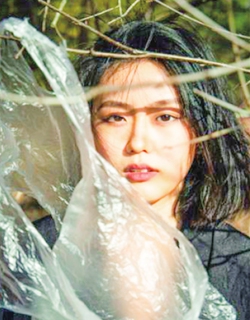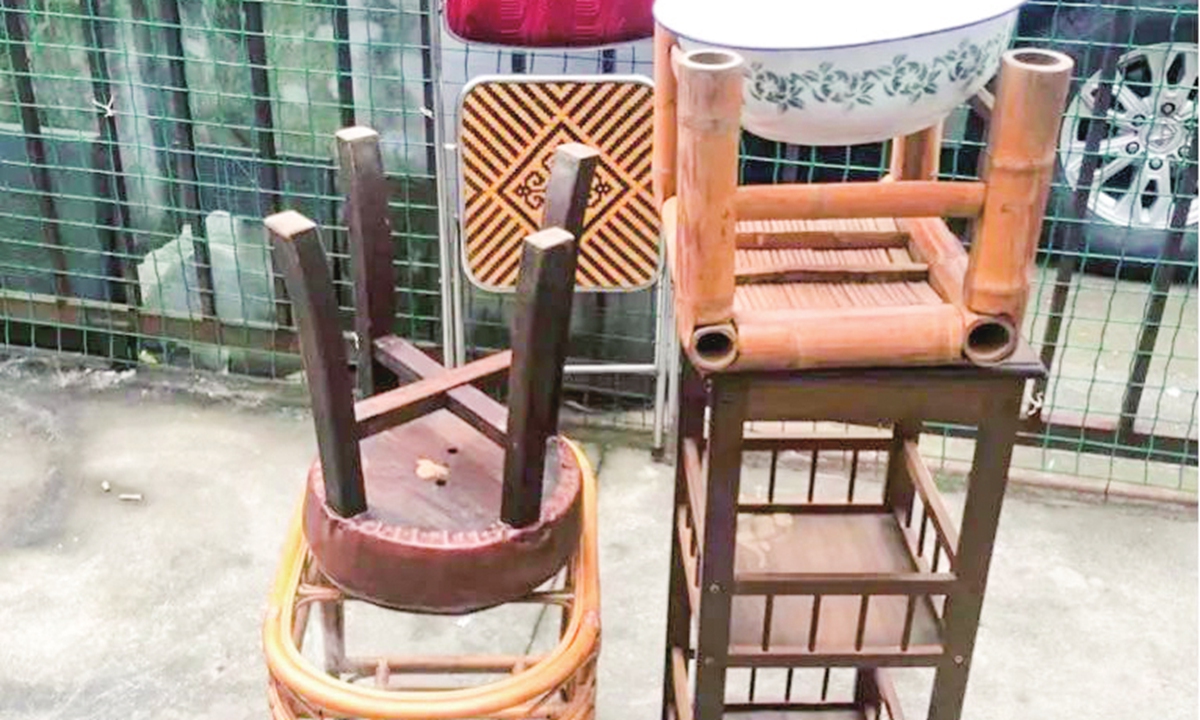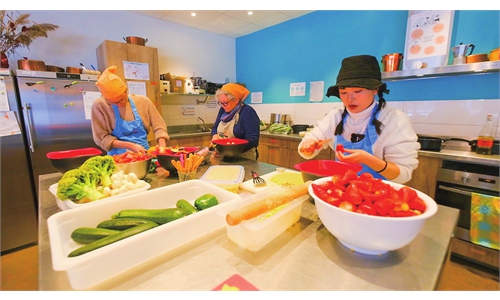‘Love myself, love my planet’: Vlogger shares zero-waste lifestyle online, encouraging more people to live sustainably
Editor's Note:
Young Chinese people in the new era are confident, aspirational, and responsible. With a global vision, they stand at the forefront of the times ready to fully commit. As a group with a strong sense of motivation, young Chinese people accept and respond the quickest and strongest to the world's trending schools of thought. Some of China's Generation Zers have begun to practice the tenets of their "global citizen" identity and use their thought processes and actions to influence the society.
The Global Times has therefore launched a series of introductory stories to China's Gen Zers who are concerned with different global topics, such as environmental protection, equality, and employment issues, and invites them to share their stories, sentiments, and ideas on social media platforms.
In this first installment, we met two vloggers who care about global environmental issues and use their own observations and examples to awaken people's awareness on the problem of food waste and how to live a more sustainable life.

The phone case, like many others things she owns and uses in her life, is what she hopes to leave little trace on the Earth, such as her bamboo toothbrush, clothing bag, or homemade washing powder.
The 24-year-old has adopted an eco-minimalist lifestyle for years. Since 2020, she has been sharing her ideas and tips online, which have received much positive feedback, with other people joining the sustainable living team.
"What I am doing now is sharing environmental protection awareness tips as a hobby. Just like how everyone nowadays is talking about camping - I will start a discussion on sustainable living, which is not stressful and extreme, and I will take it as a pleasant thing," she told the Global Times.
"In many cases loving yourself and loving the Earth are in line with each other, which doesn't require sacrifice," Su said.
Skillful, creative and funny
The online community "Traceless Life" created by Su has gathered 34,000 net users in the last two years, who would share tips or promote ideas on how to live sustainably.
In a recent post, the group members were discussing how to reuse excessive mooncake packaging after the just concluded Mid-Autumn Festival. "It always makes me anxious seeing these boxes," one said. "You could use it to keep socks," another suggested.
Su also has a vlogging channel, which has attracted around 59,000 subscribers on China's YouTube-like platform Bilibili. In a video posted in July, she explained how she managed to deal with "eco-anxiety." She also talked about whole food and repurposing used clothes in some of her latest uploads.
She has received mixed feedback. Some people have confessed that Su's videos have somewhat changed their lifestyles.
But Su admitted she was not out to influence other people when she began to share about her lifestyle. "Nowadays many people are living a stressful life and find themselves without a purpose. I just provide another way of life," she said.
Many of the items in her home in Shanghai are second-handed - from tables to cups, and even a small plant. "I think environmental protection is a very personal and high-quality way of life," she said.
Many people would ask why environmentalists choose this way of life and how far they are willing to go. When reflecting on this question, Su found a small part of it stems from her reverence for nature, but mostly, it is because "environmental protection is very interesting."
"Moreover, it can help me save money, live healthier, and gain a better understanding of nature. So that is how I live, how I am happy about my lifestyle," she said. "Environmental protection should be people-centered, instead of living as a slave to materials."
China has announced its aim to peak carbon dioxide emissions before 2030 and to achieve carbon neutrality before 2060, and has strived to meet the target by taking various measures. As the media and governments frequently mention phrases such as "green development" and "low carbon," awareness on environmental issues is also rising among many people, especially the young generation.
According to the report by Vogue Business in early September, up to 54 percent of China's Gen Z consumers believe that they have a relatively clear and accurate understanding of the concept of "sustainability." "As a positive, optimistic, and responsible generation, Gen Z is the most individualistic and most concerned group about the planet and the environment," Vogue said.

A habit and a hobby
Su learned about zero waste concepts when she was living and studying in Toronto. She would often visit local farmers' markets and pick up second-hand items.
Because of her lifestyle, some local people would ask Su if she was Japanese. That was when Su realized there was a stereotype. She also began to wonder how far environmental protection was from most Chinese people's daily lives.
Long before knowing about the term "eco-minimalism," the lifestyle had been a part of her life while she was growing up.
Su's family from the small and clean costal city Weihai in East China's Shandong Province, has always been frugal.
In high school, Su used to have a little secret: She would check all the faucets were turned off one by one before going to sleep.
These actions are tiny, but the concept behind them deeply ingrained in Su. "No matter whether you are poor or rich, wastage is disgraceful," she learned.
"My parents do not understand carbon neutrality, neither do they work in fields related to environmental protection and public welfare. They just made it a habit to not waste things in life. If I do not do it, it will be uncomfortable," she explained.
So she has been eating very little processed food, making homemade plastic wraps, bringing her own cups and utensils when eating out, and has an organic compost "farm" of 300 earthworms to digest organic waste.
Talking about the future, Su said that she might be working on the environment for a while, but would change to another subject of study while living an environmentally-friendly lifestyle.
"Now I am quite interested in regenerative agriculture," she told the Global Times.
Young Chinese people in the new era are confident, aspirational, and responsible. With a global vision, they stand at the forefront of the times ready to fully commit. As a group with a strong sense of motivation, young Chinese people accept and respond the quickest and strongest to the world's trending schools of thought. Some of China's Generation Zers have begun to practice the tenets of their "global citizen" identity and use their thought processes and actions to influence the society.
The Global Times has therefore launched a series of introductory stories to China's Gen Zers who are concerned with different global topics, such as environmental protection, equality, and employment issues, and invites them to share their stories, sentiments, and ideas on social media platforms.
In this first installment, we met two vloggers who care about global environmental issues and use their own observations and examples to awaken people's awareness on the problem of food waste and how to live a more sustainable life.

Su Yige Photo: Courtesy of Su
Su Yige buried her broken phone case into the earth to observe if it could really be organically decomposed as advertised.The phone case, like many others things she owns and uses in her life, is what she hopes to leave little trace on the Earth, such as her bamboo toothbrush, clothing bag, or homemade washing powder.
The 24-year-old has adopted an eco-minimalist lifestyle for years. Since 2020, she has been sharing her ideas and tips online, which have received much positive feedback, with other people joining the sustainable living team.
"What I am doing now is sharing environmental protection awareness tips as a hobby. Just like how everyone nowadays is talking about camping - I will start a discussion on sustainable living, which is not stressful and extreme, and I will take it as a pleasant thing," she told the Global Times.
"In many cases loving yourself and loving the Earth are in line with each other, which doesn't require sacrifice," Su said.
Skillful, creative and funny
The online community "Traceless Life" created by Su has gathered 34,000 net users in the last two years, who would share tips or promote ideas on how to live sustainably.
In a recent post, the group members were discussing how to reuse excessive mooncake packaging after the just concluded Mid-Autumn Festival. "It always makes me anxious seeing these boxes," one said. "You could use it to keep socks," another suggested.
Su also has a vlogging channel, which has attracted around 59,000 subscribers on China's YouTube-like platform Bilibili. In a video posted in July, she explained how she managed to deal with "eco-anxiety." She also talked about whole food and repurposing used clothes in some of her latest uploads.
She has received mixed feedback. Some people have confessed that Su's videos have somewhat changed their lifestyles.
But Su admitted she was not out to influence other people when she began to share about her lifestyle. "Nowadays many people are living a stressful life and find themselves without a purpose. I just provide another way of life," she said.
Many of the items in her home in Shanghai are second-handed - from tables to cups, and even a small plant. "I think environmental protection is a very personal and high-quality way of life," she said.
Many people would ask why environmentalists choose this way of life and how far they are willing to go. When reflecting on this question, Su found a small part of it stems from her reverence for nature, but mostly, it is because "environmental protection is very interesting."
"Moreover, it can help me save money, live healthier, and gain a better understanding of nature. So that is how I live, how I am happy about my lifestyle," she said. "Environmental protection should be people-centered, instead of living as a slave to materials."
China has announced its aim to peak carbon dioxide emissions before 2030 and to achieve carbon neutrality before 2060, and has strived to meet the target by taking various measures. As the media and governments frequently mention phrases such as "green development" and "low carbon," awareness on environmental issues is also rising among many people, especially the young generation.
According to the report by Vogue Business in early September, up to 54 percent of China's Gen Z consumers believe that they have a relatively clear and accurate understanding of the concept of "sustainability." "As a positive, optimistic, and responsible generation, Gen Z is the most individualistic and most concerned group about the planet and the environment," Vogue said.

Furnitures Su Yige found in second-hand market Photo: Courtesy of Su
A habit and a hobby
Su learned about zero waste concepts when she was living and studying in Toronto. She would often visit local farmers' markets and pick up second-hand items.
Because of her lifestyle, some local people would ask Su if she was Japanese. That was when Su realized there was a stereotype. She also began to wonder how far environmental protection was from most Chinese people's daily lives.
Long before knowing about the term "eco-minimalism," the lifestyle had been a part of her life while she was growing up.
Su's family from the small and clean costal city Weihai in East China's Shandong Province, has always been frugal.
In high school, Su used to have a little secret: She would check all the faucets were turned off one by one before going to sleep.
These actions are tiny, but the concept behind them deeply ingrained in Su. "No matter whether you are poor or rich, wastage is disgraceful," she learned.
"My parents do not understand carbon neutrality, neither do they work in fields related to environmental protection and public welfare. They just made it a habit to not waste things in life. If I do not do it, it will be uncomfortable," she explained.
So she has been eating very little processed food, making homemade plastic wraps, bringing her own cups and utensils when eating out, and has an organic compost "farm" of 300 earthworms to digest organic waste.
Talking about the future, Su said that she might be working on the environment for a while, but would change to another subject of study while living an environmentally-friendly lifestyle.
"Now I am quite interested in regenerative agriculture," she told the Global Times.


